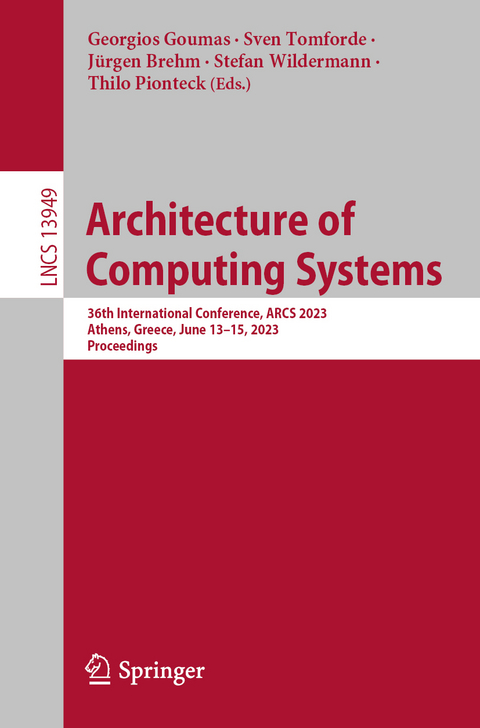
Architecture of Computing Systems
Springer International Publishing (Verlag)
978-3-031-42784-8 (ISBN)
The 18 full papers in this volume were carefully reviewed and selected from 35 submissions.
ARCS provides a platform covering newly emerging and cross-cutting topics, such as autonomous and ubiquitous systems, reconfigurable computing and acceleration, neural networks and artificial intelligence. The selected papers cover a variety of topics from the ARCS core domains, including energy efficiency, applied machine learning, hardware and software system security, reliable and fault-tolerant systems and organic computing.Back to topAccelerating Neural Networks.- Energy Efficient LSTM Accelerators for Embedded FPGAs through Parameterised Architecture Design.- A Comparative Study of Neural Network Compilers on ARMv8 Architecture.- Organic Computing Methodology (OC).- A Decision-Theoretic Approach for Prioritzing Maintenance Activities in Organic Computing Systems.- Predicting Physical Disturbances in Organic Computing Systems using Automated Machine Learning.- Self-Adaptive Diagnosis and Reconfigurationin ADNA-Based Organic Computing.- Dependability and Fault Tolerance (VERFE) Error Codes in and for Network Steganography.- Modified Cross Parity Codes For Adjacent Double Error Correction.- Computer Architecture Co-Design.- COMPESCE: A Co-design Approach for memory subsystem Performance Analysis in HPC many-cores.- Post-Silicon Customization Using Deep Neural Networks.- Computer Architectures and Operating Systems.- TOSTING: Investigating Total Store Ordering on ARM.- Back to the Core-Memory Age: Running Operating Systems in NVRAM only.- Retrofitting AMD x86 processors with active virtual machine introspection capabilities.- Organic Computing Applications 1 (OC).- Abstract Artificial DNA's Improved Time Bounds.- Evaluating the Comprehensive Adaptive Chameleon Middleware for Mixed-Critical Cyber-Physical Networks.- CoLeCTs: Cooperative Learning Classifier Tables for Resource Management in MPSoCs.- Hardware Acceleration.- Improved Condition Handling in CGRAs with Complex Loop Support.- FPGA-based Network-attached Accelerators - An Environmental Life Cycle Perspective.- Optimization of OLAP In-memory DB Management Systems with PIM.- Organic Computing Applications 2 (OC).- Real-Time Data Transmission Optimization on 5G Remote-Controlled Units using Deep Reinforcement Learning.- Autonomous ship collision avoidance trained on observational data.- Towards Dependable Unmanned Aerial Vehicle Swarms Using Organic Computing.
| Erscheinungsdatum | 27.08.2023 |
|---|---|
| Reihe/Serie | Lecture Notes in Computer Science |
| Zusatzinfo | XIX, 328 p. 125 illus., 91 illus. in color. |
| Verlagsort | Cham |
| Sprache | englisch |
| Maße | 155 x 235 mm |
| Gewicht | 527 g |
| Themenwelt | Mathematik / Informatik ► Informatik ► Netzwerke |
| Informatik ► Theorie / Studium ► Künstliche Intelligenz / Robotik | |
| Informatik ► Weitere Themen ► Hardware | |
| Schlagworte | Computer Hardware • Cyber-Physical Systems • distributed computer systems • Distributed Systems • Embedded Systems • fault tolerance • Field Programmable Gate Arrays (FPGAs) • machine learning • Microprocessor chips • Neural networks • Non-volatile Memory • organic computing • parallel processing systems • program compilers • sensors • Signal Processing • Software Design • Software engineering |
| ISBN-10 | 3-031-42784-X / 303142784X |
| ISBN-13 | 978-3-031-42784-8 / 9783031427848 |
| Zustand | Neuware |
| Informationen gemäß Produktsicherheitsverordnung (GPSR) | |
| Haben Sie eine Frage zum Produkt? |
aus dem Bereich


